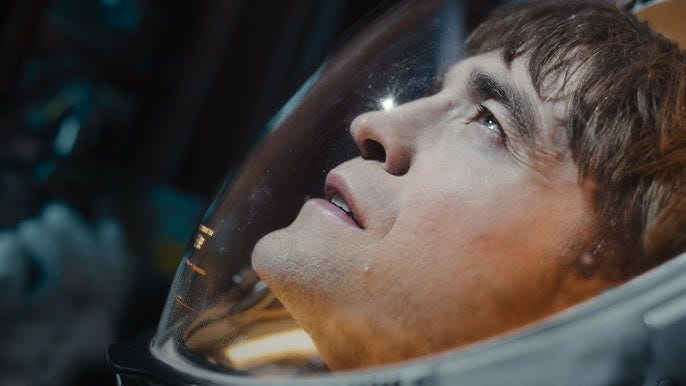SPOILER FREE
Director Bong Joon-ho had fans on the edge of their seats waiting for his next project after his Oscar-winning film Parasite. Six years later, Mickey 17 is that next project. Bong Joon-ho used that Parasite notoriety to create this exceptionally weird, funny, and striking film.
Mickey 17 follows the titular Mickey Barnes, who applies to be an “expendable” on an upcoming space expedition. In this dystopian future, humans have figured out how to reprint bodies and upload their memories after people die. This technology was banned on Earth but approved for space expeditions. As an expendable, Mickey goes on potentially lethal missions for the sake of scientific advancement, and when the missions inevitably kill him, he is reprinted. This is a grueling job that literally kills Mickey 16 times. Life on the spaceship is less than ideal, but Mickey finds solace in his girlfriend Nasha. If this set-up already seems wild, then hold on — it gets wilder.
The failed politician Kenneth Marshall leads this expedition, backed by a vague evangelical church on Earth. Marshall and his wife Ilfa are caricatures of populist leaders throughout political history. This wrinkle complicates the plot by questioning human’s desire to expand and what happens when people blindly follow a leader.
This complicated set-up necessitates many different tones throughout the story. It’s trying to be satirical and slap-stick funny, devoid of expectations and a coherent adventure, heart-warming and melancholic. When these tones work, they REALLY work. There are scenes in Mickey 17 that I will think about for months. However, some goals inevitably suffer when the film tries to do too much. Its best moments compensate for its worst, but it straddles that line very closely.
Mickey 17 would not work without Robert Pattinson’s portrayal of Mickey. Pattinson has to be the emotional and comedic center of the movie. His lovable screw-up characterization comes across as the perfect balance. Too much in one direction could easily make Mickey annoying or unsympathetic, but Pattinson lets us accept Mickey’s faults without glamorizing them. This task is even more impressive since Pattinson has to portray several different reprinted versions of Mickey. He communicates those subtle differences startlingly well.
While Pattinson dominates the screen, there are a few other notable performances. Naomi Ackie plays the perfect badass girlfriend, and Steven Yeun does a wonderful job as Mickey’s slime-ball friend Timo. Toni Collette stuns as Ilfa Marshall. Her combination of polished politician’s wife and unhinged energy just below the surface is truly chilling.
Probably the most controversial performance is Mark Ruffalo as Kenneth Marshall. Bong Joon-ho has denied allegations that Marshall is a caricature of Donald Trump; although, he has admitted Trump had some influence on the character. Instead, he says that Marshall is a combination of many populist leaders and dictators. I think this is true, especially since Bong Joon-ho is a South Korean filmmaker, and it is a bit narcissistic to assume he is commenting on an American leader. However, the way Ruffalo portrays Marshall is undoubtedly impacted by Trump.
That confusion about Ruffalo’s character is the only negative aspect of this film’s coverage. To many, he seems too much or too obvious. His part of the movie represents some of the most muddled ideas. While his character has some very funny moments, his prominence feels slightly misplaced. Marshall stands for the overly moralized, anti-scientific, pro-corporate sentiments that plague our society, but many of the same points could be made without his character.
Mickey’s story spells out the exploitation that Marshall stands for without overemphasizing it. Many filmmakers have recently felt the need to make their points excessively obvious to the audience for fear that they may not recognize them otherwise. That fear comes from declining media literacy in the population — which is an entirely different topic — but the result is often a caricature of the issue.
Despite some aspects not landing, it would be untrue to say that Mickey 17 was not well made. As usual in Bong Joon-ho’s films, the technical aspects are impeccable. The color palette and editing do a lot to articulate the dreary circumstances. Bong Joon-ho has a talent for imbuing his movies with so much style but not screaming in your face that he did so. The style is there, but it serves the story.
That meticulousness and technical excellence keep Mickey 17 afloat in many ways. It would not be nearly as fun or touching without its style.
Even though this was not a perfect movie, it was severely entertaining and creative. I appreciate Bong Joon-ho’s dedication to taking risks with his projects. Mickey 17 is undoubtedly a risk, and I think it paid off. I could easily see this becoming a sci-fi cult classic that audiences revisit for years.
I recommend Mickey 17 to anyone who loves satire, adventure, and a healthy balance of cynicism and optimism.





